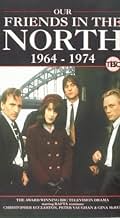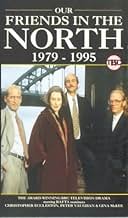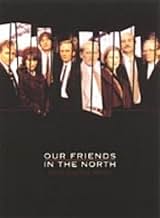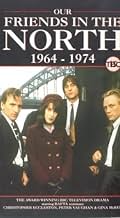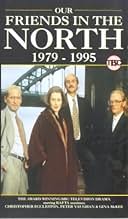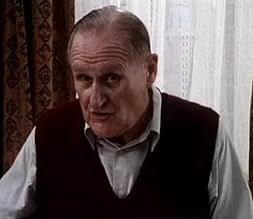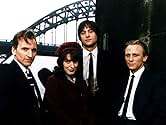NOTE IMDb
8,6/10
2,5 k
MA NOTE
Ajouter une intrigue dans votre langueDrama examining the politics and change across Britain from the Sixties to the Nineties seen through the varying fortunes of four friends.Drama examining the politics and change across Britain from the Sixties to the Nineties seen through the varying fortunes of four friends.Drama examining the politics and change across Britain from the Sixties to the Nineties seen through the varying fortunes of four friends.
- Victoire aux 2 BAFTA Awards
- 10 victoires et 6 nominations au total
Parcourir les épisodes
Avis à la une
Our friends in the North is one of those things you grow to admire in time, long after the details have left your mind and its melancholy essence has been absorbed by your consciousness. You will go back to this essence many many times as you grow old and find yourself identifying with someone or the other in this majestic work.
It covers 30 years for the most turbulent period in modern British history starting from the early sixties with its anxious flirtations with radical Marxism and ending in the bland nineties enmeshed in the muck of decadent consumerism. The plot revolves around four friends who are archetypes of the times and the greatness of Peter Flannery's script is to lay out in exquisite detail the fantastic interplay of archetypes and time. Some of the greatest of British actors played their life defining roles like Gina Mckee, Christopher Ecclestone, Mark Strong and a young Daniel Craig whose performance alone should make it worth seeing. Its a kind of work which is now largely impossible today primarily because of the class it focuses on; lower middle class Britain and their problems. In our post political age, where the public has been largely relegated to be spectators to their lives, its refreshing to witness a time where politics was the heart and soul of many lives who wanted to change the world albeit a bit foolishly. Nick ( Ecclestone ) is one such character. The cinematography is not the best but the plot makes up for it. Multi episode TV series like this was a creation of British TV and there is no better example to show how time is such a valuable thing to have in narrative expositions. Every episode focuses on a year and three decades gives the audience the chance to see characters play out their fated, entangled lives amidst all their joys and failures, swimming in the turbulence of sweeping historical changes.Every work of literature invariably comes up against the shores of narrative completeness where it faces its most troubled critics. Our Friends in the North has that self contained completeness where you are hard pressed to find leakages and thus you can say with a proud boast that its complete. There is an inevitability to the flow of lives that gives it a self sustaining rhythm till the end where you realize that nothing could have been any different. You feel for every character because by the time you have reached the end, you have come to believe in the old Buddhist maxim which exhorts man to believe in no judge-mental God who sits and punishes from above but to believe in man himself who weaves his own destiny, thread by thread which at the end of time, can chain him to the rock or carry him over to the heavens. A masterpiece which will last many a storm of time.
It covers 30 years for the most turbulent period in modern British history starting from the early sixties with its anxious flirtations with radical Marxism and ending in the bland nineties enmeshed in the muck of decadent consumerism. The plot revolves around four friends who are archetypes of the times and the greatness of Peter Flannery's script is to lay out in exquisite detail the fantastic interplay of archetypes and time. Some of the greatest of British actors played their life defining roles like Gina Mckee, Christopher Ecclestone, Mark Strong and a young Daniel Craig whose performance alone should make it worth seeing. Its a kind of work which is now largely impossible today primarily because of the class it focuses on; lower middle class Britain and their problems. In our post political age, where the public has been largely relegated to be spectators to their lives, its refreshing to witness a time where politics was the heart and soul of many lives who wanted to change the world albeit a bit foolishly. Nick ( Ecclestone ) is one such character. The cinematography is not the best but the plot makes up for it. Multi episode TV series like this was a creation of British TV and there is no better example to show how time is such a valuable thing to have in narrative expositions. Every episode focuses on a year and three decades gives the audience the chance to see characters play out their fated, entangled lives amidst all their joys and failures, swimming in the turbulence of sweeping historical changes.Every work of literature invariably comes up against the shores of narrative completeness where it faces its most troubled critics. Our Friends in the North has that self contained completeness where you are hard pressed to find leakages and thus you can say with a proud boast that its complete. There is an inevitability to the flow of lives that gives it a self sustaining rhythm till the end where you realize that nothing could have been any different. You feel for every character because by the time you have reached the end, you have come to believe in the old Buddhist maxim which exhorts man to believe in no judge-mental God who sits and punishes from above but to believe in man himself who weaves his own destiny, thread by thread which at the end of time, can chain him to the rock or carry him over to the heavens. A masterpiece which will last many a storm of time.
When this drama first hit our screens in '96, there was a certain cynicism about lengthy serials set in contemporary times, and whether it could hold a nation's attention. Casting was wide and varied - the four leads, who grow up together, grow apart, and grow together again - were played with class by Gina MacKee, Chris Eccleston, Daniel Craig and Mark Strong. Others in support included David Bradley, Peter Vaughan, Malcolm McDowell, David Schofield, Daniel Casey, and many more. Each episode moved the story along through its thirty-year span, while we watched each character reach their highs and lows until the last episode which left them all reunited.
Two things in particular stand out - the episode about the miners' strike, which was brilliantly done; and the closing credits over which Oasis' 'Don't Look Back in Anger' was played. I can't think of a better tune to close this excellent serial. One of the BBC's best.
Two things in particular stand out - the episode about the miners' strike, which was brilliantly done; and the closing credits over which Oasis' 'Don't Look Back in Anger' was played. I can't think of a better tune to close this excellent serial. One of the BBC's best.
This series is excellent, both heart warming and tragic, as the characters go through thirty years of youth to middle age experiencing the cycle of life as the society and its politics evolve in a very haphazard way. The major actors are Gina McKee, Daniel Craig, Mark Strong and Chris Ecclestone. I like the role of Gina McKee who is a favourite of mine. Aristocratic and sexy, she has a tremendous presence in any role she takes. The love scene with Chris Ecclestone in the first show is one of the most stunning I've ever seen. Over time, she evolves to become the most admirable character. Ecclestone is the political idealist who finds that the practise of politics doesn't measure up to his ambition to make life better for ordinary people. He's a man in a hurry. To his credit, he does care about people but his ambition overrules his judgement. Mark Strong seemed to be the least impressive and the one most likely to mess up. This he did. In time, however, he matured and found happiness in a second relationship. Daniel Craig grew up in a dysfunctional family. As a youth, he seemed to handle it well and was a model youth. Time and the wrong people eventually took their toll. When it was over, I was disappointed but also hopeful that sometimes things can go well.
I seem to be one of the relatively few viewers in North America to follow this series. I was fortunate to be a subscriber to Britbox because I developed a taste for British television watching PBS from 1975 on.
British television now provides more gritty fare than in the days of Alastair Cooke. I'm not complaining because this series is a good example of the best of British television. It was actually made in 1996 but I only became aware of it through Britbox.
No offence Burrobaggy but the review is stereotypical of people with historical chips on their shoulder the size of Knots Landing. WAKE UP. The north east has changed / is changing/ will keep changing. It is not the outpost of England so "fondly" reconciled by anyone living south of the Midlands.
OK, so it's gritty, grim and depressing at times and the one thing I completely agree with is that the smug McKee is truly vile. But put the history of the program in context - it portrayed things "at the time". And that's exactly what it was - yes - even with the heavy dialogue and accent. Take it for what it was, a portrayal of life when it happened throughout the decades.
I happen to think it was a tremendous series brilliantly created for TV depicting credible characters which you warm to, relate to and sympathise with. Heck you even want to be on the frontline with them battling against the Police for the rights of the Miners (and I never agreed with that dispute!) Having recently rented the series after watching it originally on TV I retained the same feeling on conclusion. It left me feeling sad, fulfilled and wanting more even though that was never going to happen. This is truly an excellent drama. Put aside a weekend, rent it and lock out the world. And whatever you do, don't believe the north east is grim.....
OK, so it's gritty, grim and depressing at times and the one thing I completely agree with is that the smug McKee is truly vile. But put the history of the program in context - it portrayed things "at the time". And that's exactly what it was - yes - even with the heavy dialogue and accent. Take it for what it was, a portrayal of life when it happened throughout the decades.
I happen to think it was a tremendous series brilliantly created for TV depicting credible characters which you warm to, relate to and sympathise with. Heck you even want to be on the frontline with them battling against the Police for the rights of the Miners (and I never agreed with that dispute!) Having recently rented the series after watching it originally on TV I retained the same feeling on conclusion. It left me feeling sad, fulfilled and wanting more even though that was never going to happen. This is truly an excellent drama. Put aside a weekend, rent it and lock out the world. And whatever you do, don't believe the north east is grim.....
I felt compelled to comment after reading a disparaging comment, I too come from a 'North/South' family with a mix of working and middle class and in no way found this patronising or contrived.
Instead I found a drama that personalised Britain's modern history, which also gave me an anchor of historical facts while watching to really emerse myself in the stories.
I found the characters at times to be self important but this was clearly the intention- Eccleston's character Nicky was self-important and selfish with his views- these are character flaws. This was the brilliance of the length of the series as you become so intimately knowledgeable of the characters. The tragedy of Geordie and the on/off nature of Nicky and Mary's relationship. By the end you feel like you have lived their lives with them, something only achievable with a top notch cast and great script.
I would unreservedly recomend this to anyone, even outside of the UK, as it is quite simply brilliant drama.
Instead I found a drama that personalised Britain's modern history, which also gave me an anchor of historical facts while watching to really emerse myself in the stories.
I found the characters at times to be self important but this was clearly the intention- Eccleston's character Nicky was self-important and selfish with his views- these are character flaws. This was the brilliance of the length of the series as you become so intimately knowledgeable of the characters. The tragedy of Geordie and the on/off nature of Nicky and Mary's relationship. By the end you feel like you have lived their lives with them, something only achievable with a top notch cast and great script.
I would unreservedly recomend this to anyone, even outside of the UK, as it is quite simply brilliant drama.
Le saviez-vous
- AnecdotesMark Strong revealed in an interview that Christopher Eccleston took a dislike to him, and outside of their scenes together the pair did not speak for the entire production. Eccleston for his part stated that they mutually disliked each other, as their characters did and suspected that Strong was jealous of him.
- Citations
Benny Barratt: Women are rubbish, Geordie. Most people are rubbish, but all women are.
- ConnexionsFeatured in Being James Bond (2021)
Meilleurs choix
Connectez-vous pour évaluer et suivre la liste de favoris afin de recevoir des recommandations personnalisées
- How many seasons does Our Friends in the North have?Alimenté par Alexa
Détails
Contribuer à cette page
Suggérer une modification ou ajouter du contenu manquant

Lacune principale
By what name was Our Friends in the North (1996) officially released in India in English?
Répondre

